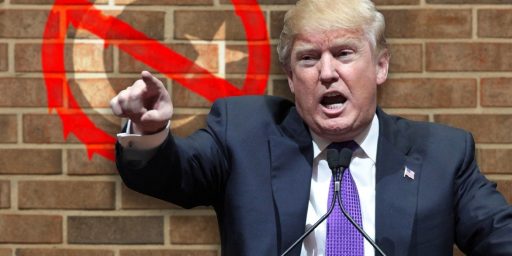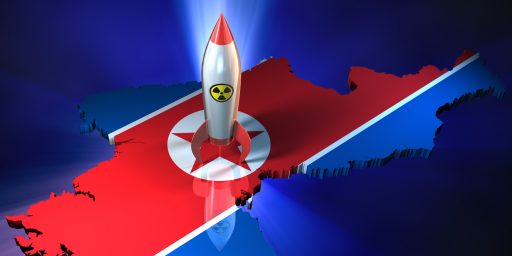Obama’s Nuke Proposal
Thomas Barnett has a very succinct explanation of why Barack Obama’s vision for a nuclear weapons-free world is unworkable:
Nukes have simply been too useful in killing great power war. I’m not giving that up for today’s minor issues with North Korea and Iran, for no other reason that both seek nukes to deter our conventional attack, so such a ban–in response to such situations–actually does nothing to address them.
His even more succinct assessment, though, is off base:
Sophomoric stuff from a campaign that should be getting more mature advice. Very disappointing.
I’m far from an Obama fan but, in his defense, he’s gotten some pretty mature advice here. As I’ve noted previously, he cribbed it from Henry Kissinger, George Schultz, Bill Perry, and Sam Nunn!






I don’t see any support for this contention. Yes the big countries going to war with each other dropped off after WW2 but to suggest that was due to nukes is a stretch. We get back to the difference between correlations and causalities. A lot of other things happened post-ww2 as well. For instance the incredible growth of communications and transportation technology as well as the subsequent globablization of business and trade. I find that a far more compelling explanation than the existence of a small club of countries with nukes.
Do we really think france and germany will be back at war if the big boy boomeroos go away?
[Now that’s not to say I find Obama’s idea workable…]
It’s unprovable, to be sure. My strong suspicion is that there would have been a direct US-USSR war rather than just proxy wars in a conventional age.
Probably not. There might have been another Korean War, though. And the chances of an India-Pakistan War or Arab-Israeli war have gone down significantly.
I guess I don’t see a real distinction worth noting between direct war and war by proxy.
There’s a pretty major difference, actually. If anything, one of scale.
There is a very strong argument to be made that the lack of a system-level war since the 1940s(e.g., WWI and WWII, the Napoleonic Wars and such) was due directly to the fact that the stakes of a direct US-USSR confrontation held the real possibility of nuclear annihilation. No small issue that.
Yes, this is an off-topic post. When are we going to discuss the SCHIP veto?
Maybe Steve will get around to it. I just don’t find it that interesting — essentially a difference in where one draws the line on a poverty program rather than anything that’s going to address any fundamental issues in the system.
Because the US and USSR proxy wars were small things…
Oh. Wait.
*shrug*
You think it’s a strong argument. I find weak personally. Notice that it’s not only the nuclear states but that big wars in general simply died out to be replaced by regional brush wars. That’s a symptom of something far larger and world changing than a handful of states with nuclear weapons.
Essentially all of the major states are also nuclear: USA, Russia, UK, France, China, India, Pakistan …
I gotta go with James on this one – Nukes have probably prevented WW III from occurring, even if it never can be proven.
As far as Obama’s statement, I think most of us on here agree with the theory that if we could eliminate all nuclear weapons forever, we would. And we all know we can’t. Obama understands this also, I would think. His statement is really a non issue, but could be a starting point to get START talks re-started should he be elected.
Oh, yeah…
…Great Britain, Israel, …
Brazil? Canada? Australia? Argentina? Saudi Arabia?
All large countries in terms of land.
Indonesia? Bangladesh? Nigeria? Japan?
All big countries by population.
Germany? Italy? Spain?
All big countries by GDP.
None with nuclear arms. For that matter not one state on the continents of Africa or South America (or Australia but I hate to give those shrimp eating fosters drinking kangaroo jockeys the honor of being their own continent!) has nuclear weapons.
Seems a pretty big stretch that the possession of nuclear arms (in some cases a mere handful, i.e. NoKo, Pakistan, India) is keeping the peace among the 180 some countries that don’t have them.
The argument was about “great power war.” Of the countries mentioned, only Germany and Japan are great powers. Germany spent the Cold War under the U.S./NATO nuclear umbrella and Japan is still hobbled by the ignominious defeat in WWII.
Obama didn’t actually promise to get rid of the US nuclear arsenal.
Most of this has been said before – even Bush came in promising to reduce America’s nuclear stockpile – and most of it is copperplate Beltway wisdom, even if Obama wants us to believe otherwise. Indeed, one could convincingly argue that both Edwards and Robertson have been there first. But there are two major parts to Obama’s policy platform being signalled.
The first is that America’s nuclear policy has to change to something because at the moment, in a post-Soviet world the hawks are still not caught up on, there isn’t a policy at all. That’s why the House has demanded that America get one before it will agree to funding any new nuclear weaponry. Obama’s clearly putting himself in the camp that believes any concept of what is called by its supporters “extended deterrence” and by others “running with nuclear scissors” is a non-starter. In that, again, he has plenty of company from the likes of Edwards, Richardson and a whole host of foreign policy wonks inside the beltway.
I’m not sure Obama is even serious about the other policy plank I see in his speech – it’s almost a throwaway line and it may well be that he, like so many others, doesn’t really mean it in a universal, no exceptions sense.
If by non-compliance he includes not being a member of the NPT at all, as he should, then the only nations that aren’t currently signatories are India, Israel, Pakistan and North Korea.
While I for one would be delighted to see an American president who would finally do away with this particular bit of looking the other way and making excuses for allies with nasty habits, there are many powerful movers and shakers who would be very unhappy indeed.
Could someone ask Obama to clarify please? And while they’re at it, could they ask Obama to pledge that under his presidency, America would cease to be among the very last of nations to pay its IAEA contributions in full every year?
Regards, C
Can I ask what criteria constitutes a “great power”? Seems like the definition is fairly arbitrary.
Besides which my counter argument was that it WASN’T just the great powers that stopped having big wars. Around the world the big wars seemed to have disappeared. In other words it’s like you’re arguing that Men drive cars and so cars are clearly associated with the y chromosome, and I’m saying “uh, but women drive cars too…”
Big countries with nuclear weapons did stop having large wars, but big countries without nuclear weapons and small countries also stopped having big wars. Hence the correlation is highly questionable.